- Home
- Michael McDowell
Wicked Stepmother Page 3
Wicked Stepmother Read online
Page 3
“About going out on the night that Father was buried. And for not telling Louise we wouldn’t be there for dinner after she went to so much trouble.”
Verity shrugged nonchalantly, and remarked, “You know what I was thinking? I’ll bet that when Louise gets laid she’s like a lifer’s wife on a conjugal visit.”
Cassandra took a sip of wine and remarked, “When Jonathan gets back to the table, we’ll give you a hand and lift you out of the gutter.”
“I’ll bet Father and Louise did it on the floor. That’s more comfortable anyway, if she’s on top. And I imagine that she was on top.”
“Verity, you’re being disgusting. You’re talking about our father!”
“Honestly, Cassandra, you sound as if you thought the man didn’t have any sexual urges. The only unnatural thing about Father was that he found Louise Larner desirable. And that he married her. God! My mother-in-law is now my stepmother! I feel as if I were living in darkest Appalachia.” She took a sip of wine, glanced around to see if Jonathan was off the telephone yet, and then looked back to Cassandra. She said thoughtfully, “Louise was bad enough when she was only father’s business partner. She was considerably worse in the part of my mother-in-law. Now in the third act she comes on stage triumphant in the simultaneous roles of widow and stepmother. She’s a woman who wants her name all over the program of a very cheap melodrama.”
Cassandra was silent a moment. She averted her eyes, and then asked in a low voice, “Don’t you think Father’s death rather . . . strange?”
“Do you?” Verity returned flatly.
Cassandra nodded her head slowly. “Yes. It was just so odd, the whole Atlantic City business.”
“Too odd,” Verity agreed. “I don’t buy Louise’s story either. It’s too pat, too—I don’t know—too something.”
“What do you mean?” said Jonathan, slipping back into the booth.
“Would anybody who knew Father,” said Cassandra, “ever imagine that he would die in Atlantic City, of all places, slumped across a blackjack table?”
“Absolutely not,” said Verity, “but Louise said they were there on business—that investment nonsense she was babbling on about. Do you think she was lying?”
“Things just don’t seem to add up,” said Cassandra hesitantly. “Father did occasionally take sleeping pills, and of course he liked his brandy and soda after dinner—but he wasn’t the type to get things mixed up, and forget what he had taken and what he hadn’t. Father could recite the name of every client he had for the past ten years, and then tell what they paid for their property. He could have listed what every one of us got for Christmas in nineteen sixty-two. Father was hardly the type to forget he had just swallowed a handful of sleeping pills.”
“That’s true,” said Verity after a moment. “What do you think really happened?”
“Do you think . . . ,” Jonathan began, then trailed off.
“Think what?” prompted Verity.
“That he committed suicide?” said Jonathan. “It had certainly occurred to me.”
“No,” Cassandra exclaimed. “Father thought suicide was cowardly and selfish and not respectable.”
“After a few days of marriage to Louise,” Verity offered, “he may very well have changed his mind.”
“If he was going to commit suicide he wouldn’t have married Louise first,” said Cassandra. “And he certainly wouldn’t have killed himself in New Jersey.”
“There wasn’t an autopsy, was there?” asked Verity.
“Of course not!” exclaimed Cassandra. “Why should there have been?”
“To find out exactly how he died,” said Cassandra.
“He died of a heart attack,” said Jonathan. “That much was obvious, I guess.”
“Right,” said Verity glumly.
“Are you actually thinking that Louise . . . ?” Cassandra began, but she didn’t finish.
“No, not really,” sighed Verity. “I’m no fan of Louise’s, but I don’t think she’s stupid enough to murder Father only four days after she married him. I’m not sure I believe her story, but I can’t figure out why she’d lie about it either.”
“Louise is willing to fight for what she wants, but I don’t think she’s willing to risk murder for it.”
“It,” repeated Jonathan. “That’s the question. Just what is it that Louise does want?”
“I’m not worried about that,” said Cassandra. “But this whole business with Father bothers me. I wish there were some way we could find out what really did happen in Atlantic City.”
“Just wait,” said Verity. “If Louise is lying about something, she’ll trip up. Just pay attention to what she says and does. If there was something funny going on, we’ll figure it out sooner or later. Louise isn’t that smart.”
They finished their wine in silence.
“Did you get hold of Apple?” Cassandra asked Jonathan suddenly.
He nodded, and drained his glass.
“Apple?” Verity inquired.
“Jonathan’s new girl friend,” explained Cassandra.
“Miriam Apple,” said Jonathan. “But she thinks Miriam sounds too biblical. Everybody calls her Apple.”
“She used to have a band,” added Cassandra with a smile. “They were called Apple and the Corps.”
“Very cute,” said Verity impassively. “Jonathan, do you mean to tell me that you are actually dating a woman who sang in a rock group?”
“Sings,” said Jonathan, with a small smile of pride.
“She’s still in a band,” added Cassandra.
“Good God,” said Verity. “I’m going to have to revise my entire opinion of you, Jonathan.”
“Apple and I get along just fine.”
“Are you living together?”
“Sort of,” he replied, wagging his head. “We still keep separate apartments, though.”
“I see,” said Verity. “You know, this really is very interesting, Jonathan. And after all those boring ‘Cliffies’ you used to drag through the house. What kind of group does she have?”
“Punk!” said Cassandra.
“Dear God!” cried Verity, sitting back suddenly and laughing. “Can I take this? You’re actually going out with a singer in a punk rock band? After six years of Exeter, four years of Harvard, and three salary reviews at Commonwealth & Providential you now decide to consort with an eighteen-year-old woman with a green and purple Mohawk? I’ll bet she dresses head to toe in leather—or dyed buckskin, probably—and wears lucite platform shoes with goldfish in the heels. Probably got a tattoo of a skull in flames across her shoulders. And her great ambition in life is to shove Nancy Reagan’s face into a paper shredder. Have I described her perfectly?”
“No,” said Jonathan coldly. “I’ll have you know that she’s pleasant and intelligent. She holds down a very good job, at a publishing house. Her last promotion was announced in Publishers Weekly. And she is not eighteen.”
The waiter laid the check on the table.
Cassandra picked it up, and both Jonathan and Verity allowed her to do so without protest.
“This is on me,” said Cassandra, unnecessarily.
“Where does she live,” Verity asked, “this punk singer?”
“Commonwealth Avenue, near Exeter,” replied Jonathan. “She shares the place with her drummer.”
“Male?”
“Yes.”
Verity shook her head. “I don’t know about you, Jonathan.”
“What do you mean?”
“You always used to be such a preppie. Now you’ve got a girl friend who has a male roommate, and it doesn’t seem to bother you at all. A real preppie wouldn’t allow his fiancée to share an apartment with another man. Is he gay?”
“Hardly,” said Jonathan. “He and Apple used to be lovers when they were students at Emerson, then they broke up, and now they’re just friends.”
Cassandra had paid the check and received her change. She figured out a tip, placed it on the tr
ay, and sighed. “Well, I suppose it’s time to go home and sit around the living room and talk about how wonderful Father really was.”
“I don’t want to go back to the house,” said Verity firmly. “At least not until I’m sure that Louise has gone home. The one thing to be grateful for in all this is that Father didn’t have time to move Louise into the house before he died.”
“I don’t want to go back there either,” Jonathan admitted.
“What we need,” Verity suggested, “is a bar that’s dark and loud.”
“And all stagger home drunk at two in the morning?” Cassandra asked.
“We don’t have to stay for last call,” Verity pointed out.
“And we don’t have to get drunk either,” said Jonathan.
“I do!” said Verity, lifting Cassandra’s wineglass and drinking off the little that remained. Cassandra still hesitated to give her sanction to the plan.
“I guess we could go to Betsy’s Pit,” said Jonathan, “just for a little while, I mean.”
“All right,” said Cassandra at last.
“Betsy’s what?” asked Verity with a long sigh.
Dinner that evening for Louise was a dismal affair. Wearing a simple full-length dress of scarlet silk with dolman sleeves and a wide sash tied loosely at the waist, she sat alone at the head of the table in the empty house, and picked at the food she’d so carefully prepared. It grew cold on her plate, until the only smell in the room was the burning paraffin of the chafing-dish candles. She was humiliated and angry that Cassandra, Jonathan, and Verity had left for the evening when she had specifically announced her intention to fix dinner for them. No amount of distress, no unwillingness to remain in the house could excuse such crass impoliteness. As their father’s widow, Louise thought, smoldering, she deserved a lot more consideration than she was getting.
Louise put down her fork and dropped her folded napkin beside her plate. If her stepchildren chose to snub her, then she would simply revel in the luxury of being alone in the house that would be hers when the will was read. She sat back and glanced about the dining room. Then she turned slightly and stared down the long marble-floored hallway. She got up and went to the French doors. Pulling aside the draperies, she gazed out into the moonlit gardens. The shrubs and bed of daffodils and tulips were all black and pale gray. She turned back and, placing both her hands on the table, looked about the room again with satisfaction. Leaving her food untasted on her plate, she wandered about the first floor of the house, wondering at the space and the luxurious emptiness of it. Twenty principal rooms, three acres of ground, stone walls nine feet high to protect her privacy—Louise could scarcely believe her good fortune.
All her life Louise had been thrust into apartments. Each had seemed tinier than the last. Her father had been custodian of a large apartment building in Philadelphia, and as part of his salary got a two-bedroom basement flat rent-free. In one of those bedrooms, with a single horizontal window looking out onto a concrete walk where the residents walked their dogs, Louise had lived seventeen years with sisters one and two years older than herself. Both her father and mother had been at home all day. The place was never empty. Louise might not have gotten along with her sisters under any circumstances, but their cramped quarters ensured years-long battles between them.
To escape that bedroom and that basement flat, Louise married a construction worker named Fred Larner. He was twenty-two, she was eighteen, and the day before their wedding he made a down payment on a house in a subdivision he was helping to build in the town of King of Prussia, near Philadelphia. Louise would not only leave her apartment, her parents, and her sisters—she would leave the claustrophobic city as well. Until the house was finished, however, she lived with her husband in a single room over a corner grocery two blocks from her old home. Here at least there were times during the day when she had the place to herself, and when she looked out of the window she saw sky. She had often dreamed of going to college, but with her family’s straitened finances there had been no possibility of that.
Three weeks before she and Fred were scheduled to move into the house in King of Prussia, she was brought word that he had been killed on the job. A crane cable, lifting a prefabricated roof into position, had snapped. Fred was crushed by a corner of the falling roof.
Louise wept bitterly, less for her husband than for the house she was now convinced she would never have. She remained another week in the room above the grocery before moving back in with her parents.
Fred had carried a fifty-thousand dollar life insurance policy on himself, but he had failed to sign this over to his wife. His mother and father were beneficiary, and refused to help their daughter-in-law even when Louise informed them that she was pregnant.
Fearing the medical consequences of an illegal abortion, and hoping that a grandchild would charm some of Fred’s insurance money out of his parents, Louise went through with the pregnancy. Eight months after Fred’s death, Louise gave birth to a boy, whom she named Eric. By the time Eric was christened, his Larner grandparents had moved to Florida on Fred’s insurance money, and did not even send a silver spoon.
On the day after that christening ceremony, Louise packed a small suitcase and took the train to Boston, leaving her infant son in the care of her mother and father. She secured a rented room in the West End of the city, and took a job as a secretary in a small South End realty firm. Monthly she sent forty dollars home to reimburse her parents for their care of her child, but she called only on Christmas and her own birthday, and even then never asked after the boy.
Eleven years after her arrival in Boston, she applied for and received her realtor’s license. The office where she was employed went out of business when the owner was jailed in a kickback scheme involving plumbers and electricians. Louise got a job with the Hawke agency in Back Bay, and was able to take a lot of the burden off the shoulders of the recently widowed Richard Hawke. After delivering some papers to her employer’s home in Brookline, and seeing in what style the widower lived, Louise vowed to herself that she would marry the man come hell or high water.
Although Richard Hawke had allowed himself to be consoled by a succession of handsome women, he looked on Louise as a valuable company employee and not a bedmate. Louise bided her time. She moved from the West End to Back Bay. Her new apartment was very small, but it had an unimpeachable address. She had looked into the possibility of purchasing a house for herself, but Boston prices were prohibitively high, and, as a single woman, Louise was considered a bad credit risk.
One day, when she had been working at the Hawke agency for a little more than five years, she came home and found a strange teenager loitering about the entrance to her building. She said to him, “Don’t you have anything better to do?”
He said to her, “Ma?”
Her parents had died together in the wreck of a chartered bus carrying nuns and local parishioners on a tour of springtime Washington, D.C. Eric hadn’t discovered his mother’s address until after the funeral.
Louise took her son in because she didn’t know what else to do with him. He turned out to be ill-tempered, spoiled, and generally difficult to manage. She soon discovered that his bouts of ill-temper coincided with his monetary needs. She learned that she could stave off almost any amount of bad behavior with a five-dollar bill. When he was eighteen she found him a rent-controlled apartment, and installed him in it. “You keep up the payments,” she said. “Because if you don’t, you won’t come back to live with me.”
Eric, in three stormy years of living with his mother, had acquired a certain superficial polish. He was very good-looking, and his manners, when he wanted something, could be charming. He found jobs with no difficulty, but his innate laziness usually prevented his holding on to them for long. Despite her threats, Louise often helped him out with his rent.
Neither Louise nor Richard understood why her son and his daughter should get married, but they did so, when they were both twenty-five. Eric later confessed
that Verity had been pregnant, but had miscarried on the honeymoon. Louise never told her employer of this, despite the intimacy that had crept up on them after fourteen years together in the office.
At a realtors’ convention in New York City, Louise finally managed to seduce a very drunk Richard Hawke. She never allowed him to forget that one moment of intimacy. After a time there were others, and Louise began to talk about marriage. In lieu of that, Richard offered her a partnership in the firm. Louise took it, and didn’t mention marriage for fully two years. Then she resumed her assault with increased vigor. Richard eventually relented and agreed to wed her the following autumn. Louise didn’t want to wait that long, and finally persuaded Richard to marry her a week before the celebration of Cassandra’s promotion.
Four days later Richard Hawke collapsed across a blackjack table in Atlantic City and died.
When it became apparent to Louise that the trio would not return even in time for dessert, she propped open the kitchen door and carried all the food back in. Rather than preserving it, she very carefully scraped it into the disposal and methodically destroyed all trace of the meal she’d prepared. If they apologized later, she’d say that she hadn’t done a thing. She washed the dishes and placed them in their proper cabinets. Through all this her expression was grim. When she had finished in the kitchen, she went to the small telephone niche beneath the stairs, snapped on the green-shaded table lamp, and shut herself in. As she dialed she yanked a clip-on earring from her lobe, and shoved her hair back over her ear.
The line connected after two rings, and without waiting for a greeting, Louise said—in her coolest business tone—“Eric, it’s Mother.”
“Hold on a minute, Mrs. Larner, and I’ll get him,” said a hesitant female voice.
“Barbara?” Louise asked, with unrepressed irritation.
“How are you, Mrs. Larner? Eric told me about Mr. Hawke. I was sorry to hear about it. He said you had only been married a few days, I’m so—”

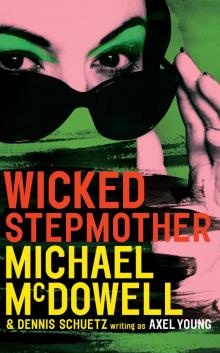 Wicked Stepmother
Wicked Stepmother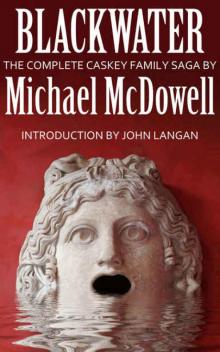 Blackwater: The Complete Caskey Family Saga
Blackwater: The Complete Caskey Family Saga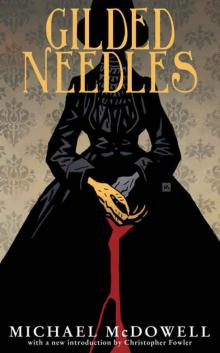 Gilded Needles (Valancourt 20th Century Classics)
Gilded Needles (Valancourt 20th Century Classics)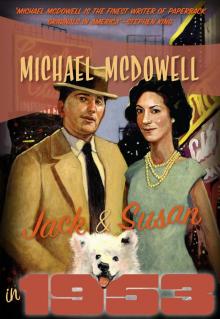 Jack and Susan in 1953
Jack and Susan in 1953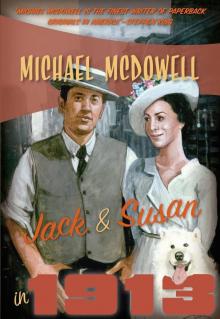 Jack and Susan in 1913
Jack and Susan in 1913 Rain
Rain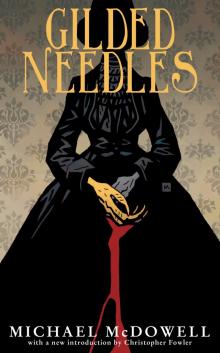 Gilded Needles
Gilded Needles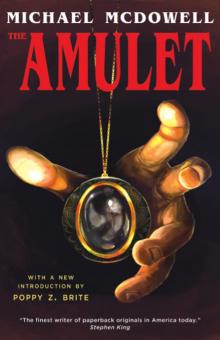 The Amulet
The Amulet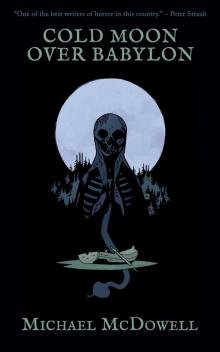 Cold moon over Babylon
Cold moon over Babylon The Elementals
The Elementals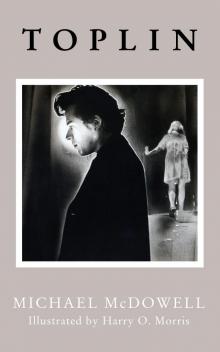 Toplin
Toplin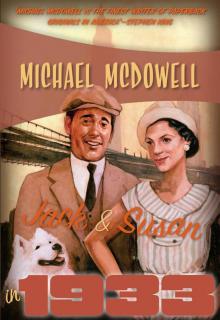 Jack and Susan in 1933
Jack and Susan in 1933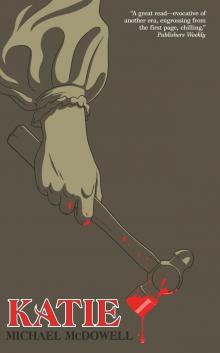 Katie
Katie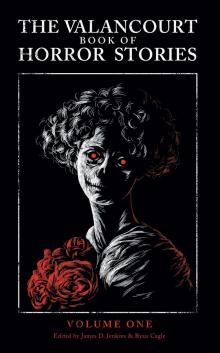 The Valancourt Book of Horror Stories
The Valancourt Book of Horror Stories